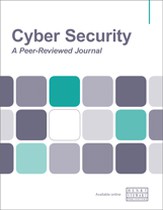Successfully tackling cybercrime at the local level
Abstract
This is an opinion piece which seeks to contribute to the wider debate on cybercrime prevention, based on the policing experience of the author over the past 22 years, during which he has been fortunate enough to work across a number of disciplines including intelligence, investigations, economic crime and criminal justice. More recently his work has included designing, implementing and running the first joint police force collaboration cybercrime unit in the UK. Achieving successful cybercrime reduction and prevention may require police forces to more closely complement national safer behaviour campaigns with pragmatic local community action. At the heart of this endeavour should be a recognition that people often need other people to help them understand how to change, why the change is needed and the consequences if they don’t. Multimedia cybercrime communication campaigns may be insufficient on their own to reach many of the most vulnerable. The impact and scale of cybercrime precludes any single organisation from tackling it alone. To meet this challenge, local policing is developing a model to identify and support community groups, local authorities, voluntary sector and public sector in reaching people who rely more on personal contact than broadcast messages. In its simplest form, the idea is to ‘plug together’ existing networks by better aligning those with the knowledge and material with those who do not.
The full article is available to subscribers to the journal.
Author's Biography
Andy Haslam has led a mainly operational police service over the past 22 years working in the Avon and Somerset, Surrey and Sussex police forces. Holding senior detective positions managing criminal investigations, intelligence, online offending, digital forensics, economic crime and latterly cybercrime has given him a wide exposure to many challenging and complex cases. Over the past three years his main interest has been developing the tactical and strategic local policing response to the ongoing rise in cyber offending. This activity has included setting up an operational team with both proactive and reactive capability. He has particularly enjoyed working closely with a range of partners such as the UK Government Home Office, global business organisations, charities, academia, local government and law enforcement agencies. Always keen to develop his thinking, he gained a Masters in information security from Royal Holloway University London in 2016 as well as achieving his CISSP in 2015. These combined experiences have led to a genuine interest in developing sustainable models to help people get safe and stay safe.
